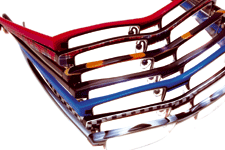Returning to our series on British frame design, Rob Moss visits what Business Week described as one of Europe's '100 hottest growth companies'
International optics is dominated by companies from Italy, France and Germany, but if you happened to read an issue of Business Week last October you may have a spotted a British company listed among Europe's 'hottest 100 growth companies'.
While you would probably be unsurprised to find someone like Specsavers floating around in a league table of commercial success, it is a smaller - and indeed younger - business that is number 76 in the rankings.
Founded in 1988 by a banker, a retailer and a lawyer, Inspecs began distributing eyewear in the UK for the likes of Alain Mikli, Yohji Yamamoto and Jean Paul Gaultier. But much has changed since then, with the Bath-based company designing, manufacturing, distributing and marketing almost 4,000 eyewear designs each year.
Marketing director Chris Borton explains how it soon became apparent with the early brands that the designers involved were keen to create design statements and sometimes lacked a commercial focus. 'That had to change as we grew, we needed to supply customers with product that really suited them.'
So began the company's quest not only to design product that would sell but also to create a portfolio of brands to help its customers cater for its patients. This is reflected in the company's current collections. For the older patient, it has Austin Reed; for the younger patient, FCUK. For the more affluent, Nicole Farhi; for less expensive tastes, it produces frames for own-label sale.
Theatre of creativity
Inspecs' approach to creating designs is to use key themes from the brands. Its five eyewear designers work across the portfolio to create diversity and interest. Similarly in the sales field, its sales team sells across the portfolio. The idea is for the reps to pass on the lessons learnt in developing the collections - including merchandising support - to the client. Borton says that 'from six feet, optical product looks the same, so you have to look at how you create interest, some theatre. If we can't supply that, then what are they buying other than a badge? A badge which is invisible more than a foot away.'
Borton says that 'from six feet, optical product looks the same, so you have to look at how you create interest, some theatre. If we can't supply that, then what are they buying other than a badge? A badge which is invisible more than a foot away.'
Inspecs employs 300 people worldwide and turns over more than $40m. It operates in every continent of the world. It has retail outlets in Ukraine, Russia and the US, subsidiaries in the US, India, Finland, Hong Kong and Japan and joint partnerships in Germany, France and Italy.
Developing the brand
As it has grown, however, the management has had to make some tough decisions, particularly with regard to its most successful line, the controversial FCUK. 'Next to Boots the Chemists, Inspecs is still the biggest licensee that French Connection has,' says Borton. 'We've done very well out of FCUK, but they've also done very well out of us, particularly in expanding their distribution and increasing brand awareness.'
Borton says that French Connection is hugely aware of how its FCUK brand is evolving. 'The consumer has adopted this brand and made it their own in terms of distribution, product availability, brand awareness, PR, people wearing it in the street. So it's become a mass brand.
'It's impossible to control its exclusivity. One of the tenets of the brand when it was first launched was that this is not an exclusive, niche fashion brand for people in the know - it's non-exclusive, it's for everybody, it's a brand of the people. So you can't get choosy about distribution and say "Oh we can't go into that place", you have to get the balance right.
'But like the Calvin Kleins of this world you lose the ability to put a very exclusive tag on things. But I think the reality in this day and age is that actually that's fine.'
When it began selling FCUK to Specsavers, Inspecs received criticism from both independent practitioners and chains, but the argument was often emotional rather than commercial. Once initial reaction had died down, it found customers, who had left in protest, returning as they realised their customers wanted the brand.
'It shouldn't just be that brand is in that multiple so I'm not going to have it - it doesn't work like that in any other market at all,' says Borton. 'Every time Specsavers advertises the fact that it sells FCUK, Storm, Red or Dead, we know that FCUK sales go up, not only in Specsavers but in independents too. They may not believe it in certain cases, but we know it.'
Talking about the same topic, Robin Totterman adds: 'We've been open about what we've done while some of our competitors haven't been. We continue to demonstrate through exclusive promotions etc our commitment to the independent sector.'
Unusually it is Totterman, the chief executive, who is in charge of the design process. He gets involved with every product developed and he says that some lessons have been learned the hard way where design is concerned.
'In the early days when we were distributing some of the really high end product, opticians loved to see it but it was more like "Come and show us your latest stuff, we'll have a look and a giggle but we won't buy anything because it won't sell". Inspecs was forced to hold large stocks to be able to supply opticians in a timely fashion, but inevitably the optician had difficulties selling the products through in any viable numbers to justify decent stock levels.
'When we transformed our company from a distributor to a producer we set out to use elements of the design world, which is everything from the look and feel of the product to the packaging, the POS to everything else, but high on our agenda was the need to be able to offer it at a sensible price. Value for money was and remains key to Inspecs motto. That's what we're about and that's why we are succeeding and that's why we have managed to dramatically expand our private label stuff.
'I think the industry's currently coming out of a period of mediocrity where no matter how big the brand or small the brand it's pretty much the same sort of product that's being offered. What we try to do is keep a commercial eye on what we're doing. In other words we try to offer good value, good design.'
Does that mean making all the design safe? 'No. What it means is that each collection will have elements of the more extreme, middling and commercially safe. Ninety per cent of what is sold in our industry is safe - you can't ignore that.'
One of the ongoing struggles is remaining objective about the designs, not to become too complacent or too detached from what consumers will buy. 'We take a decision with of a lot of our bestsellers to say, actually, we are going to move on from this. So we will actually discontinue a best seller and replace it with something fresher and hopefully better. You have to push the boundaries.'
The growth of Inspecs' current portfolio of brands, its international presence, and the fact that each week it is contacted by another three or four potential licensors, illustrates just how successfully it has pushed the boundaries, not just in design but in the type of commercial control that gets you noticed by American business magazines.
Register now to continue reading
Thank you for visiting Optician Online. Register now to access up to 10 news and opinion articles a month.
Register
Already have an account? Sign in here
